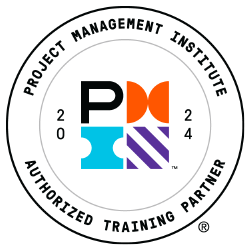What’s Covered in IIL’s PMP® Exam Prep Course?
About the Program
This course serves as a crucial component of your preparation for the Project Management Professional (PMP)® Certification Exam. By participating in this course and taking the exam, you will enhance your ability to compete effectively in the field of project management. This course will enable you to implement the universally recognized Project Management Institute (PMI)® practices, which are important for successful project delivery and essential for demonstrating expertise in your field.
Who Should Attend
This course is designed for individuals or teams who are seeking formal, globally recognized project management skills and capabilities. You will learn standardized approaches for PM techniques that are applicable, transferable, and consistent across your organization.
The course enables you to develop professionally, increase your project management skills, apply a formalized and standards-based approach to project management, and advance in your career. After taking this course you will be ready to apply for the highly sought after Project Management Professional (PMP)® certification.
Course curriculum includes:
Module 1: Business Environment
The Business Environment lesson addresses foundational knowledge about how projects align with the organization’s strategy to provide business value. It introduces project management principles and Agile principles to provide a basis for managing projects. In addition, we cover important business concepts such as project governance, project compliance, change management and organizational change.
Topics in Module 1 include:
- Foundation
- Strategic Alignment
- Project Benefits and Value
- Organizational Culture and Change Management
- Project Governance
- Project Compliance
Module 2: Start the Project
Stakeholders are the reason we do projects. From the very beginning of the project we should be identifying, analyzing, and engaging with project stakeholders. The project team is a key set of stakeholders that we work with to deliver the project. Key to project success is ensuring that all stakeholders have a common understanding of the project, the project lifecycle, and the development approach(es) that will be used to deliver value.
Topics in Module 2 include:
- Identify and Engage Stakeholders
- Form the Team
- Build Shared Understanding
- Project Approach
Module 3: Plan the Project
Planning, whether done at the start of the project or continuously throughout the project, is the backbone of project management. Planning entails exploring, defining, and refining scope, quality, resources, schedules, and costs. This information is evaluated through the lens of risk management prior to being integrated into a project management plan, tailored for the needs of the organization and the project.
Topics in Module 3 include:
- Planning Projects
- Scope
- Schedule
- Resources
- Budget
- Risks
- Quality
- Integrate Plans
Module 4: Lead the Project Team
Leadership is a set of behaviors that team members employ to create a collaborative environment for all stakeholders. Each project and each project team is unique, therefore the way we implement leadership skills flexes to meet the needs of the situation. We will cover leadership skills critical to project success including communication, coaching, empowerment, and conflict management.
Topics in Module 4 include:
- Craft Your Leadership Skills
- Create a Collaborative Team Environment
- Empower the Team
- Support Team Member Performance
- Communicate and Collaborate with Stakeholders
- Training, Coaching, and Mentoring
- Manage Conflict
Module 5: Support the Project Team Performance
Throughout the project we monitor progress to ensure performance is going as planned. Undoubtedly there will be variances, issues, impediments, and changes that arise. Project managers evaluate the situation and apply necessary actions to ensure successful delivery. Part of being accountable for project success entails continuous learning and improvement, and communicating this information as appropriate.
Topics in Module 5 include:
- Implement Ongoing Improvements
- Support Performance
- Evaluate Project Progress
- Manage Project Issues and Impediments
- Manage Project Changes
Module 6: Close the Project/Phase
The end of a phase or the project entails ensuring that the project deliverables can bring about the promised benefits and value. This includes knowledge transfer and proper administrative closure.
Topics in Module 6 include:
- Project / Phase Closure
- Benefits Realization
- Knowledge Transfer

International Institute for Learning
485 Madison Avenue, 13th Floor
New York, NY 10022-5803
+1-212-758-0177
+1-800-325-1533
Virtual Learning Support: +1-212-515-5100
Administration/Production: +1-212-515-5074
© 2024 International Institute for Learning. All rights reserved.



